
What Is Skyr and How Is It Made?

- What Is Skyr?
- How Is Skyr Made?
- What’s the Difference Between Skyr and Yogurt?
- Is Skyr Healthy?
- Is Skyr Good for the Stomach?
- Can People with Lactose Intolerance Eat Skyr?
- Is Skyr Suitable for Vegetarians?
- How Do Icelanders Eat Skyr?
- Other Ways to Eat Skyr
- The History of Skyr
- Skyr's Recent Rise in Popularity
- Where to Find the Best Skyr in Iceland
- The Best Skyr in Reykjavik
- How to Buy Good Skyr Outside of Iceland
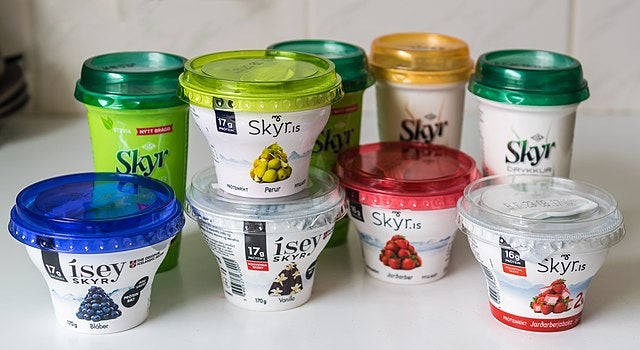
Eating traditional Icelandic food can be a fantastic way to experience Icelandic culture during your vacation. Many travelers to Iceland want to taste unusual local delicacies such as fermented shark or puffin meat. Others prefer to eat food they're familiar with, such as fish, seafood, and lamb.
Skyr is an excellent choice if you want to try some more interesting Icelandic food without having to eat something you imagine will be disgusting. It's rich, creamy, and delicious, and you can eat it at any time of the day.
A fantastic way to try some Icelandic food is on a food tour in Reykjavik. A three-hour walking tour of Reykjavik will let you explore Iceland's vibrant capital city and taste traditional Icelandic food like skyr.
There's a lot to learn about skyr, including what it is, how it's made, and how it became famous worldwide. A visit to a dairy farm like Efstidalur or Erpsstadir can let you meet the cows that produce the milk for skyr and learn about how this Icelandic yogurt is made.
Photo above by Ralf Roletschek, from Wikimedia, Creative Commons. No edits made.
What Is Skyr?

Photo by Jennifer Boyer.
Skyr (pronounced “skeer”) is an Icelandic dairy product with a texture and taste like very thick yogurt. It has a rich and creamy texture similar to Greek yogurt. Many people outside of Iceland refer to it as Icelandic Greek yogurt, but it is a type of cheese rather than yogurt, somewhat like ricotta or mascarpone.
Like Greek yogurt, skyr has a slightly sour taste. However, it's much milder in flavor, so most people find it more enjoyable to eat.
How Is Skyr Made?
Skyr is made from cow's milk. Producers traditionally use skim milk, which has a very low-fat content. Once they've separated the milk from the cream, they heat it to around 165 F (approximately 73 C) for about 15 to 20 seconds before cooling it back to about 99 F (roughly 37 C).
Producers of skyr then add unique live cultures, often taken from a previous batch of skyr, including live bacteria and rennet. These cultures turn the milk from a thin, watery product into thick, creamy skyr. After fermenting for around five hours, the producers cool the product to 64 F (approximately 18 C) before straining.
Once the product has thickened, it's ready to be strained. Straining off the whey makes skyr even thicker. Whey is the watery by-product of the skyr-making process.
By this point, the skyr is ready to be packaged and sold to consumers.
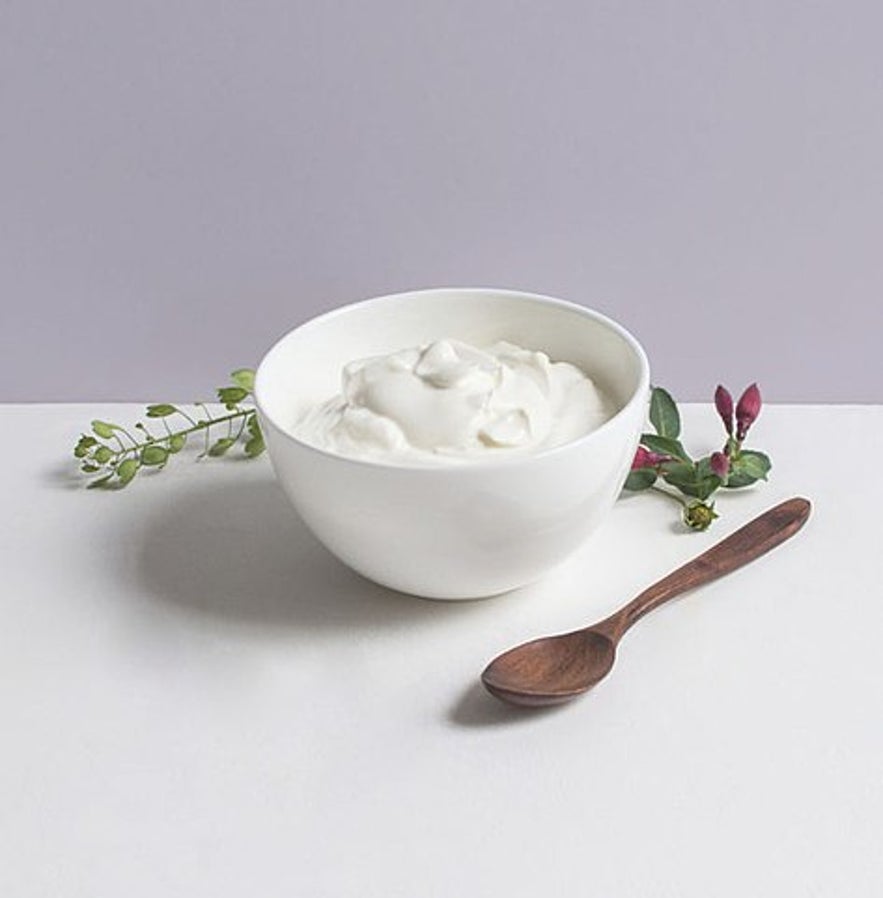
Photo by IcelandicProvisions, from Wikimedia, Creative Commons. No edits made.
Many visitors to Iceland are surprised that skyr is made using skim milk because it has such a creamy texture that they assume it must be high in fat. It takes four cups of skim milk to produce just one cup of skyr.
Some producers add sugar or flavorings to their skyr before they sell it. You can now easily find vanilla skyr and skyr with berries in Iceland, or try it with more tropical flavors, such as mango and coconut.
Although most producers make skyr from skim milk, some brands also produce a version made from full-fat milk. Full-fat milk creates even thicker and creamier-tasting skyr.
What’s the Difference Between Skyr and Yogurt?

Photo by Chris and Sue.
Foreign travelers in Iceland often think that skyr is a type of yogurt. Skyr is usually packaged the same way as yogurt, and you can find it in the same aisle at the grocery store. However, there are a couple of critical differences between skyr and yogurt that you should know about.
Yogurt and skyr are both made using live bacterial cultures. Most producers of both dairy products use Lactobacillus bulgaricus and Streptococcus thermophilus. These cultures turn lactose, a sugar naturally present in milk, into protein.
However, the crucial difference between yogurt and skyr is that skyr is made using rennet. Producers add rennet and bacteria to the heated milk, which then forms curds and becomes creamy.
The addition of rennet makes skyr a type of cheese rather than a kind of yogurt.
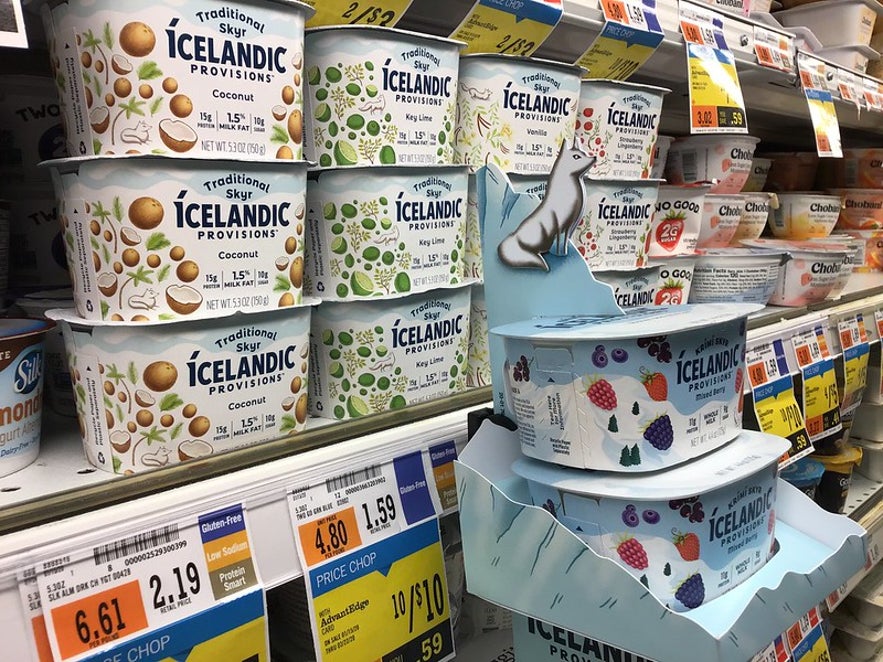
Photo by Mike Mozart.
As noted, another important difference is that yogurt is traditionally made using full-fat milk, but skyr is usually produced with skim milk.
Traditional Greek yogurt is made using full-fat sheep's milk, although many producers outside of Greece use cow's milk. Icelandic skyr is made from cow's milk.
These differences result in skyr's thick texture and creamy flavor. Skyr is also lower in fat than Greek or regular yogurt and has a higher protein content.
Is Skyr Healthy?
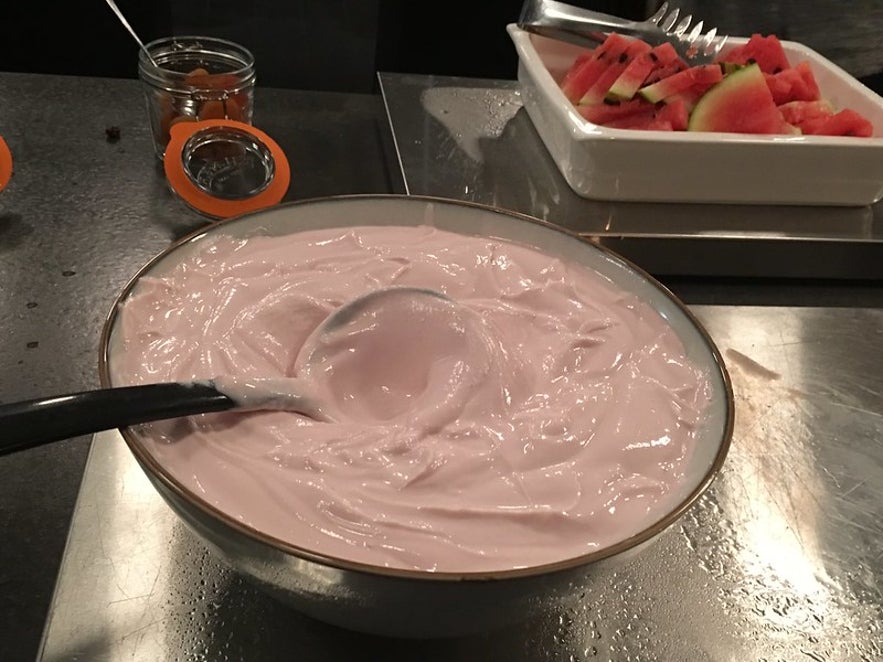
Photo by Lynn Friedman.
Skyr is a nutritious dairy product because it's very high in protein but low in fat.
A seven-ounce (200-gram) tub of KEA skyr contains approximately 0.85 ounces (around 24 grams) of protein. It also has less than 0.003 ounces (about 0.6 grams) of fat.
Since skyr is made from cow's milk, it's also high in calcium and B vitamins.
Is Skyr Good for the Stomach?
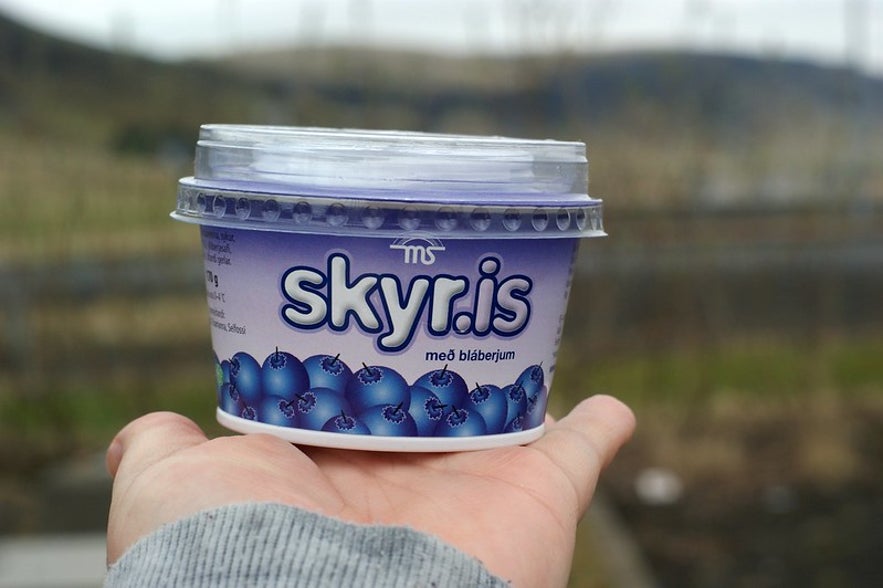
Photo by omgponies2.
Skyr is a fermented product, so it contains many probiotics. Many people believe that the probiotics in skyr can promote stomach health by helping maintain the balance of the natural bacteria in your stomach and intestines.
The probiotics can be particularly beneficial if you're recovering from an illness or have been taking antibiotics.
However, it's worth noting that there has yet to be much scientific research into the effects of probiotics on stomach health or health in general. It's more of a traditional remedy than a doctor-approved one.
Can People with Lactose Intolerance Eat Skyr?
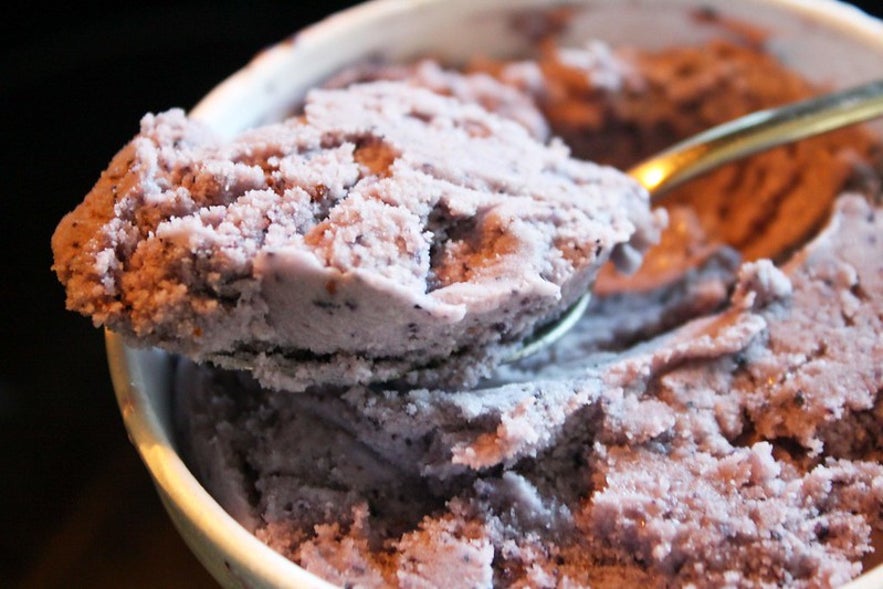
Photo by Rakka.
Skyr is made from cow's milk containing lactose. However, many brands of skyr can be suitable for people with mild lactose intolerance problems. That's because up to 90% of the lactose in milk is drained away during the production process.
Many people with mild or moderate lactose intolerance can enjoy skyr without major problems. However, if you have a severe intolerance or allergy to lactose, it's recommended that you avoid skyr.
Is Skyr Suitable for Vegetarians?
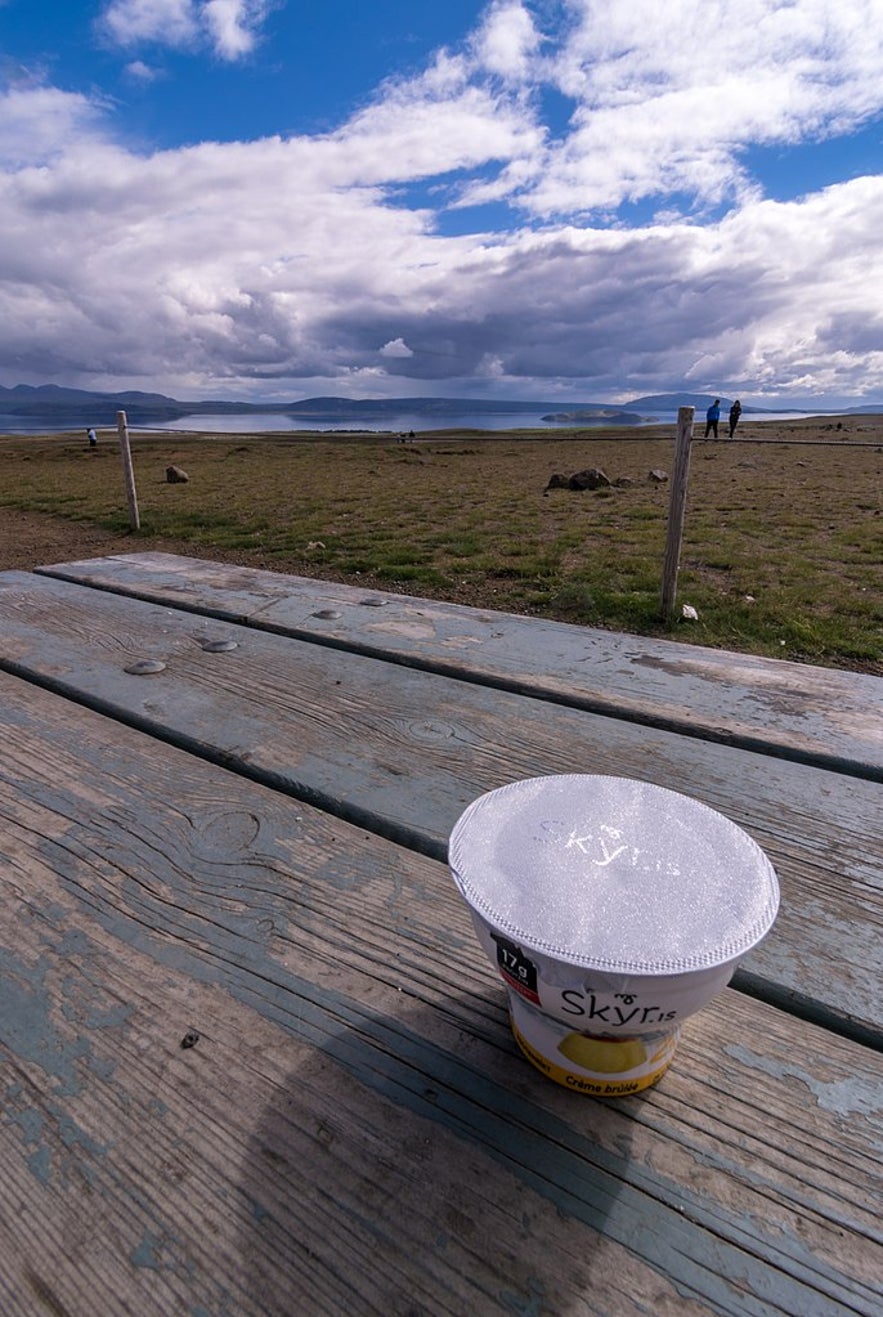
Photo by Ralf Roletschek, from Wikimedia, Creative Commons. No edits made.
Skyr is made from cow's milk, so it isn't suitable for vegans. If you're a vegetarian who eats dairy, you probably think that skyr is an appropriate source of protein for your diet, but it's not as straightforward as you might expect.
Producing skyr involves adding rennet and live bacterial cultures to heated skim milk. Rennet traditionally comes from enzymes taken from cows' stomachs, meaning skyr isn't suitable for strict vegetarians.
However, it's also possible to use plant-based rennet to produce vegetarian-friendly skyr instead.
Unfortunately, producers in Iceland don't have to label their products with details of their production process. That means it's almost impossible to tell which brands of skyr contain animal rennet and which are suitable for vegetarians.
If you want to avoid all products made using animal-derived products, the safest thing to do is to avoid eating skyr altogether. Alternatively, you can reach out to individual producers to ask which rennet they use in their skyr.
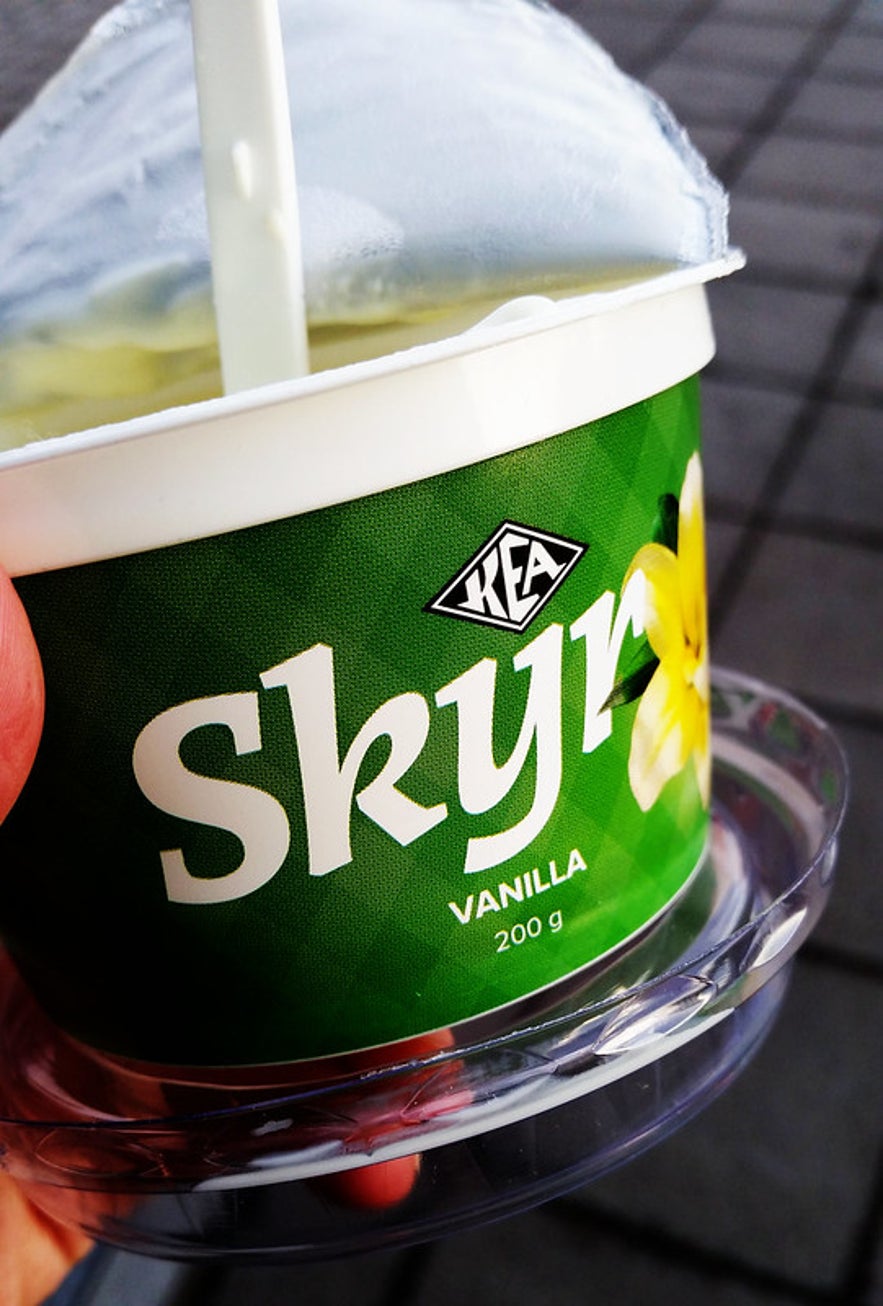
Photo by Viv Lynch.
There are two leading brands of skyr made in Iceland: KEA and Isey. KEA’s skyr is made using animal rennet, so it's unsuitable for vegetarians who want to avoid animal-derived products. Isey’s skyr is made using a plant-based rennet, so the resulting dairy product is suitable for vegetarians.
How Do Icelanders Eat Skyr?
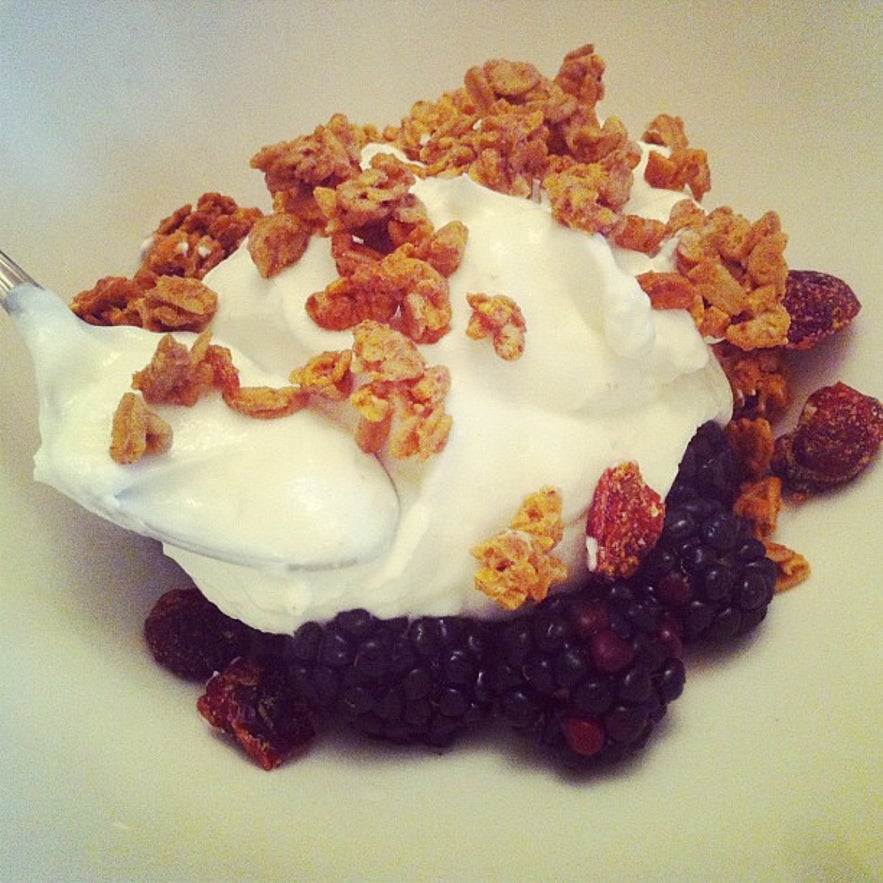
Photo by Alyson Hurt.
Now that you know what skyr is and how it's made, you might be wondering how and when Icelanders eat this dairy product.
You can eat skyr plain, just as you'd eat yogurt. Many Icelanders like to sweeten it with sugar or add fresh fruit such as berries. You can also eat skyr with granola or porridge oats. Skyr and oatmeal is a typical breakfast in Iceland.
It's also possible to use skyr as an ingredient in baking. Many recipes in Iceland use skyr as a topping instead of cream cheeses like mascarpone.
Other Ways to Eat Skyr
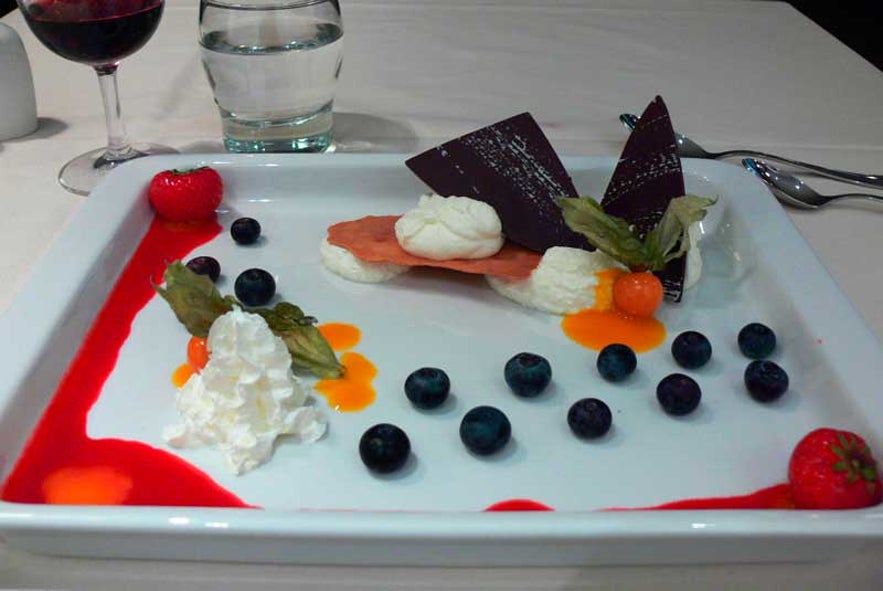
Photo by Nicholas Ng.
Many Icelanders like to eat skyr at breakfast. Since it's so high in protein, it's a brilliant choice for breakfast because it will keep you feeling full right up until lunchtime. However, you can eat skyr at any time of day as a snack, and many Icelandic people do.
People often serve skyr as a side or accompaniment to main dishes like fish or meat. You can even use it as a dipping sauce for crackers or fruits.
The History of Skyr
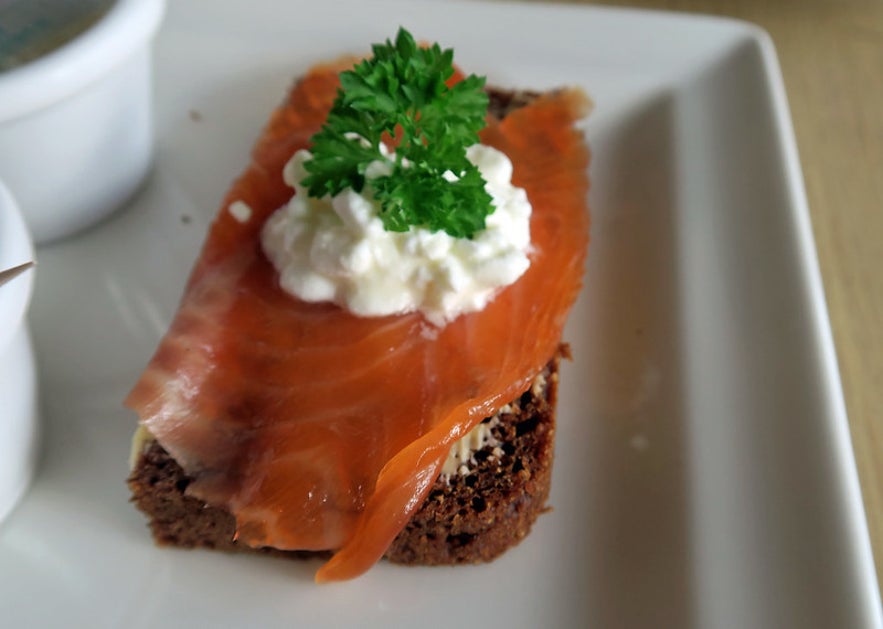
Photo by Kirk K.
Skyr has been an essential part of Icelandic cuisine for over 1,000 years. When the Vikings arrived in Iceland, they brought many cultural practices, including food traditions.
The Vikings brought skyr to Iceland at the first settlement, which is usually dated to around 874. In Viking times, skyr was popular all around Scandinavia, as Vikings took it with them on their travels. However, since the end of the Viking period, skyr disappeared from other Nordic countries and was only popular in Iceland for a long time.
You can read about skyr in many Icelandic sagas and other works, which proves that this dairy product has existed in the country since at least the time they were written.
Visit the National Museum of Iceland to see three jars filled with fossilized skyr and learn more about the history of Viking settlers in Iceland and Scandinavia.
Skyr's Recent Rise in Popularity

Photo by Calli and Travis.
After skyr fell out of popularity in Scandinavia, it existed only in Iceland for several centuries. However, skyr has begun to gain popularity worldwide thanks to its high levels of protein, low levels of fat, and probiotic content.
It's now possible to find skyr in grocery stores in other countries like the US and the UK. There are companies outside of Iceland producing their own skyr. This means it's now much easier to enjoy skyr even when you're outside of Iceland.
Where to Find the Best Skyr in Iceland

Photo by Ola Nystrom.
Skyr is easy to find in Iceland because it's such a popular product. You should be able to find it in most supermarkets. Look in the dairy aisle in grocery stores, as it's typically refrigerated with yogurts.
You might also find skyr as part of a breakfast buffet in your hotel or accommodation. If your B&B or guesthouse includes breakfast, you'll probably be able to try skyr.
Another great option is to go on a food tour in Reykjavik. There's no guarantee that the tour operator will take you to try skyr, but it's one of the most famous Icelandic foods, so you can at least ask your guide where to find the best skyr in Iceland.
Many people visiting Iceland also enjoy visiting dairy farms that produce locally made skyr. Several dairy farms near Reykjavik make skyr, and visiting one can be a fantastic way to learn about Icelandic farming culture.
The Best Skyr in Reykjavik
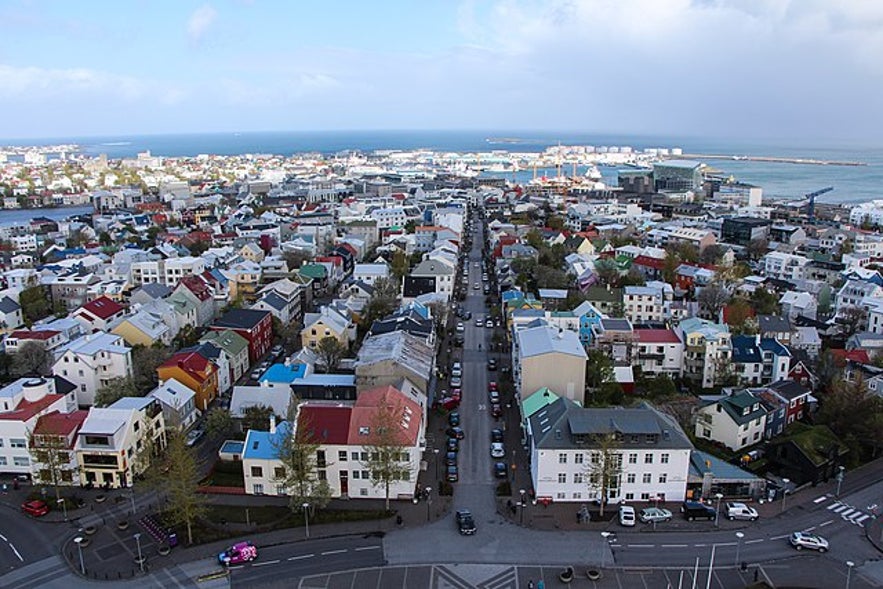
Photo by Ivana Viani, from Wikimedia, Creative Commons. No edits made.
If you're looking for skyr in Reykjavik, you won't have to look far. It's easy to find. Most of the best restaurants in Reykjavik have skyr on the menu somewhere, so you should be able to find some if you're eating out for breakfast, lunch, dinner, or grabbing a quick snack.
To help you find the best skyr in Reykjavik, here are a few great places to try this delicious Icelandic Greek yogurt.
Isey Skyr Bar
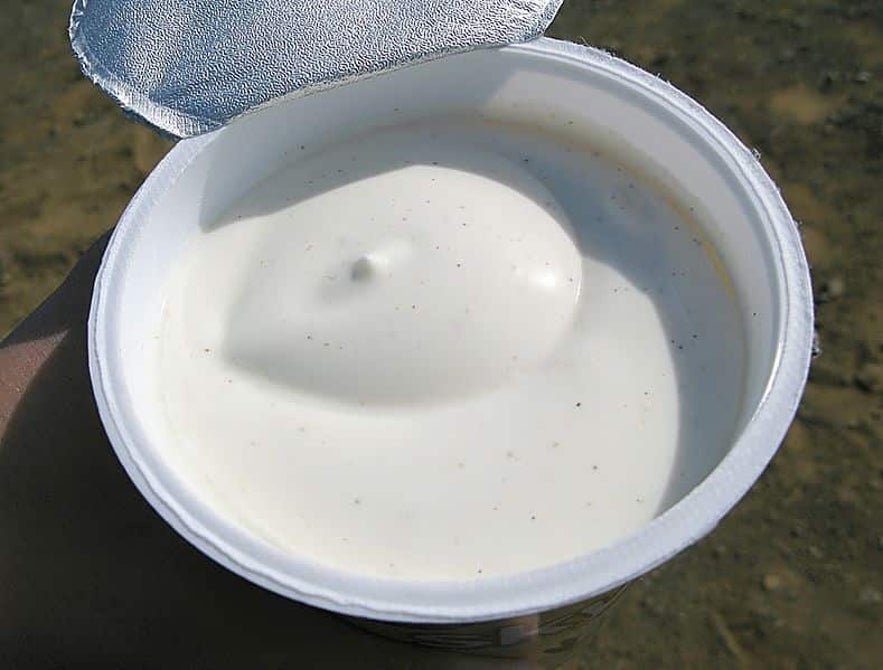
Photo by Schnee, from Wikimedia, Creative Commons. No edits made.
There are several branches of the Isey Skyr Bar around Iceland (as well as two in Finland and one in Amsterdam). You can visit the Isey Skyr Bar in downtown Reykjavik to try delicious skyr while exploring Iceland's capital.
Isey is one of the world's largest skyr producers, and their skyr is free from lactose, meaning it's a great choice if you are usually intolerant to dairy products.
The Skyr Factory
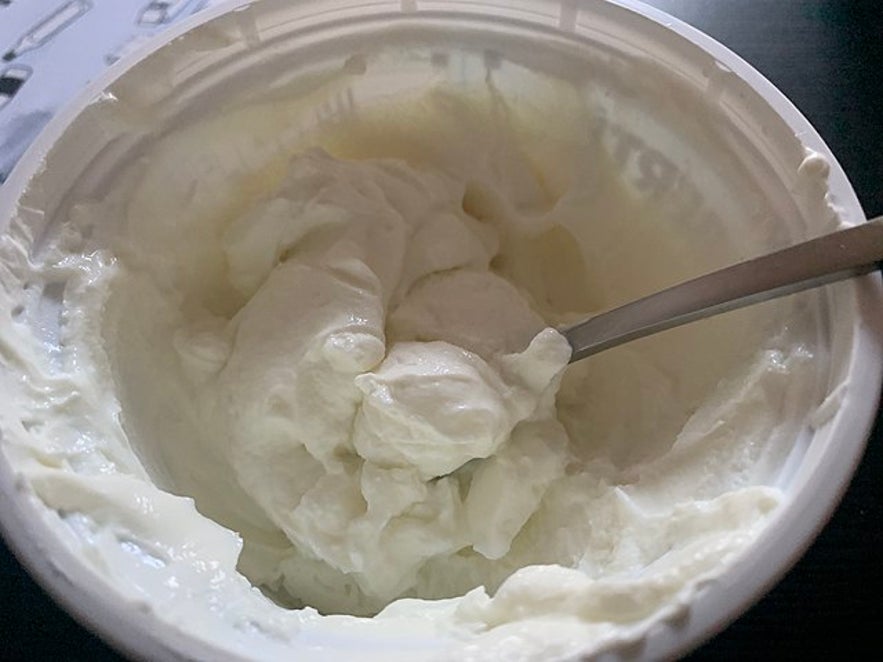
Photo by Skyler Wang, from Wikimedia, Creative Commons. No edits made
The Skyr Factory in central Reykjavik is another excellent place to try skyr on the go. The Skyr Factory is a cafe dedicated to serving skyr in a variety of flavors. They sell delicious skyr pots topped with granola and fresh fruit, or you can order smoothies made with skyr to try something a bit different.
101 Reykjavik Street Food
If you're looking for a quick lunch while sightseeing in Reykjavik, 101 Reykjavik Street Food can make an ideal stop. You can try Icelandic food served in a relaxed environment. A hearty bowl of lamb soup is a great way to warm up after a morning out in the cold Icelandic weather.
Besides main courses, this diner-style restaurant serves skyr in various flavors for dessert.
Cafe Loki
Another fantastic place to try skyr in Reykjavik is Cafe Loki, located close to the Hallgrimskirkja church.
The cafe specializes in traditional Icelandic food, so you can try a wide range of delicacies here. From mashed fish and smoked trout to lamb and warming soups, the menu is full of local foods that visitors might want to try.
The menu also features skyr served in a few different ways. You can eat it with sugar and cream, as a pancake topping, or as an ingredient in a delicious Icelandic cake.
Skal!
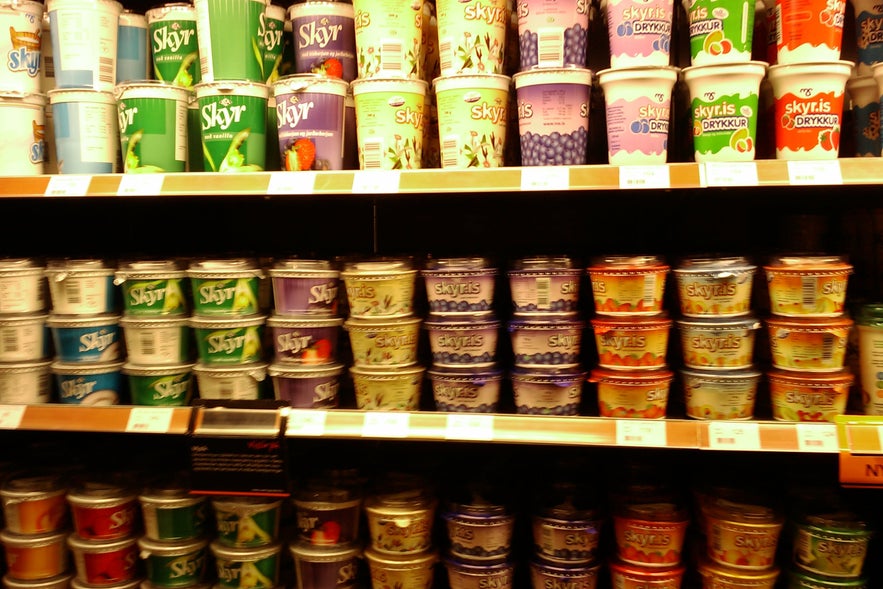
Photo by Xfigpower, from Wikimedia, Creative Commons. No edits made.
Skal! is an excellent restaurant in central Reykjavik on the Laugavegur shopping street. The menu is small but includes delicious local food like salt-baked beets, Icelandic scallops, and cod.
There's only one dessert on the menu, locally grown rhubarb served with skyr mousse. Try it for yourself to enjoy Icelandic skyr with a difference.
How to Buy Good Skyr Outside of Iceland
It's now common to find skyr in supermarkets worldwide, so you don't have to be in Iceland to try authentic skyr. However, buying from Icelandic producers is a good idea if you want the best skyr.
Icelandic Provisions is a brand from the US, but they make their skyr in partnership with the oldest farmer-owned dairy in Iceland.
Siggi’s is another American company, but its founder (Siggi Hilmarsson) is originally from Iceland. His skyr is made in the Icelandic style and is easy to find in American grocery stores.
Arla is a sizeable Scandinavian dairy company based in Denmark. It's the biggest producer of dairy products in the whole of Scandinavia and the biggest dairy in the UK. In addition to goods like butter and cheese, it produces Icelandic-style skyr for sale in Denmark and the UK
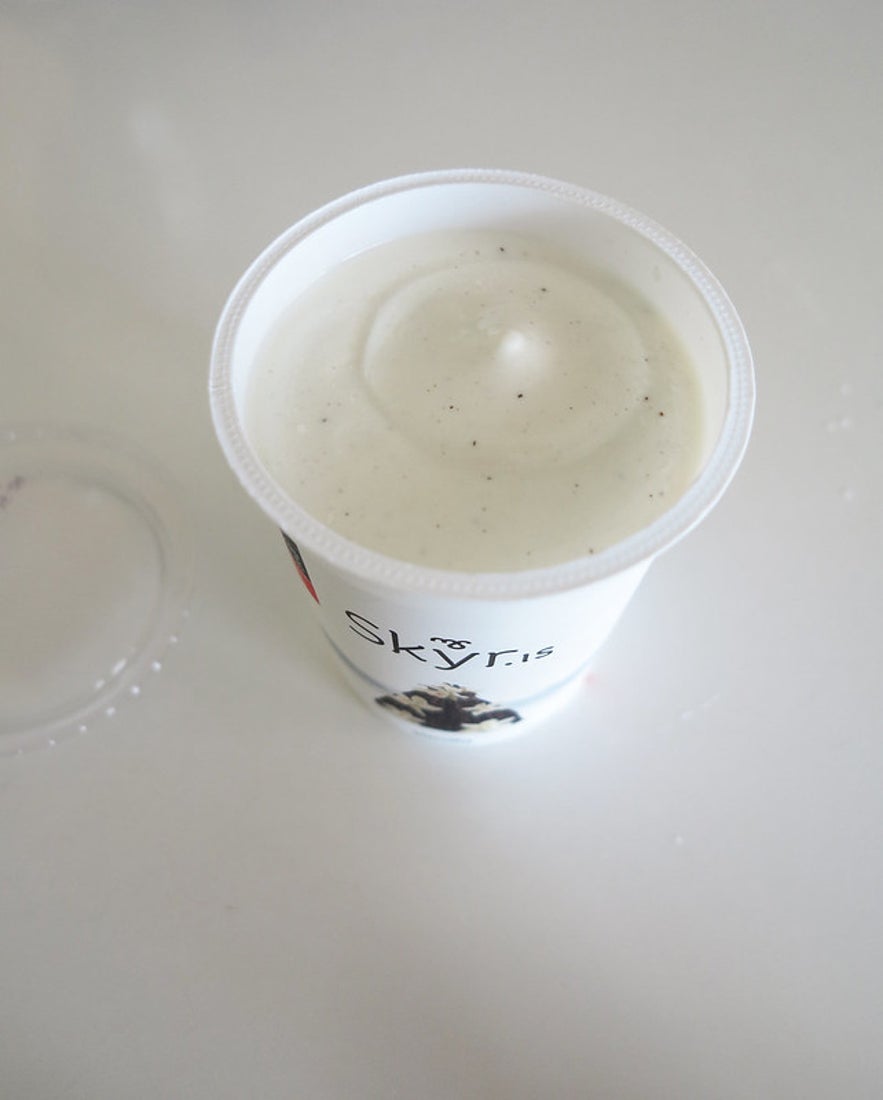
Photo by Emily Bean.
We hope this tells you everything you need to know about skyr, including what it is, how it's made, and where to find the best skyr in Iceland. Why not learn more about seasonal Icelandic food and how to eat well in Reykjavik on a budget?
Otros artículos interesantes
Las 13 Mejores Cosas que Hacer en Akureyri (y Alrededores)
Descubre las 13 mejores cosas que hacer en Akureyri y sus alrededores. La ‘Capital del Norte’ de Islandia es la puerta de entrada a algunas de las mejores y más únicas experiencias en Islandia, como e...Leer más
Guía Completa de las Erupciones Volcánicas del Sundhnukagigar en 2024
Entérate de todo lo que debes saber sobre las erupciones volcánicas del Sundhnukagigar, Islandia, en 2024. ¿Cómo afectan a los habitantes de Grindavik? ¿Cómo de fuertes son las erupciones recientes en...Leer más
Club VIP de Guide to Iceland: Guía Completa
Si eres cliente de Guide to Iceland, no solo tendrás acceso a la mayor selección de tours, alojamientos y coches de alquiler de Islandia, sino que también podrás disfrutar de grandes descuentos y ofer...Leer más

Descarga la mayor plataforma de viajes a Islandia en tu móvil para gestionar tu viaje al completo desde un solo sitio
Escanea este código QR con la cámara de tu móvil y pulsa en el enlace que aparece para añadir la mayor plataforma de viajes a Islandia a tu bolsillo. Indica tu número de teléfono o dirección de correo electrónico para recibir un SMS o correo electrónico con el enlace de descarga.




















